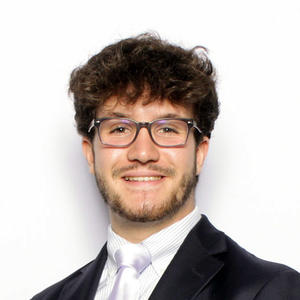
Thinking Outside the Medicine Cabinet
When Mourad Mokrani ’26 applied for and accepted a campus job with the university’s new Center for Health and Business, he had no idea that it would profoundly influence his academic interests. After all, the Lexington, Massachusetts, native had already decided to pursue dual majors in Management (with a concentration in Entrepreneurship) and Finance.
However, working with the center has opened Mokrani’s eyes to the countless opportunities that exist for business students in the health industry, one of the most complex and important sectors of the U.S. economy. “I have a lot of family friends who work in biotech, but they’re all involved with the science side of things,” he explains. “I never really stopped to consider how important the business side of the house — finance, accounting, marketing, management — is to the overall success of these companies.”
This awareness has inspired Mokrani to consider a career in this rapidly growing industry. He has now added a minor in Health and Industry to his academic course load and — thanks to the Center for Health and Business, which launched in October 2023 — is currently interning with Third Rock Ventures, a Boston-based venture capital firm that invests in and creates life science companies. Kevin Gillis, MBA ’93 is partner and chief operating officer at the firm.
“It’s been an incredible experience,” Mokrani says, noting that while he works primarily with the finance team, he’s been able to connect with and learn from employees in all areas of the company. His internship has not only broadened his understanding of how entrepreneurs are transforming the business of health but also deepened his appreciation for the industry’s higher purpose. “At the end of the day, it’s about more than just making money,” he says. “It’s about identifying new medicines and technologies that can literally save people’s lives.”

According to Danielle Blanch Hartigan, executive director of the Center for Health and Business and associate professor of Health Studies, “aha” moments like these are precisely what the center is trying to foster — not only among students, but also among the university’s faculty, staff, alumni, and corporate and community partners.
“The health industry plays an outsize role in our nation’s economy,” Hartigan explains. “But it’s also plagued by longstanding issues of efficiency, transparency and access that directly affect the health and well-being of every member of our society.” These problems stem from the fact that the industry encompasses a vast array of disciplines — from clinical care and biomedical research to data analytics and financial administration — that make it difficult to balance the needs of patients, providers and policymakers.
Achieving that balance, Hartigan says, requires health industry leaders to think outside the medicine cabinet, harnessing the power of business to better understand connections among the health industry’s various disciplines and identify innovative, scalable and sustainable solutions.
That’s where Bentley’s new Center for Health and Business comes in. The center builds upon the blueprint provided by the university’s Health Thought Leadership Network (launched in 2014), bringing together more than 90 faculty and staff members from various departments and disciplines, as well as students, alumni and corporate partners in health, to explore the industry through a multidisciplinary lens. A generous gift from entrepreneurs Chris Smith ’91, MBA ’92, P ’19 ’24 and his late brother Greg Smith ’91, Hartigan says, “provided the catalyst we needed to begin transforming our dreams for the center into reality.”
The Center for Health and Business aims to transform the business of health in three areas: education, research and key partnerships with leaders in the health industry. For example, site visits to area companies (known as Onsite Insights) offer students a firsthand look at careers in health-related fields. So far, students have toured the headquarters of the Boston-based construction company Suffolk to see how the company uses technology to design state-of-the-art science labs, research centers and other health facilities, and Boston Scientific, which develops medical devices to improve patient health outcomes. The center also sponsors a “Hot in Health” speaker series, where students can take in the advice and insights of Bentley alumni and other professionals working in the industry.
Leveraging the experience and expertise of Bentley’s strong alumni network, Hartigan says, is a key factor in the center’s ability to achieve its mission and vision, given that Massachusetts is a global hub for health care and life sciences. Hundreds of health- related companies, large and small, are headquartered in the state, many in close proximity to Bentley’s Waltham campus.
Kevin Gillis understands better than most what this means for the future of the health industry in Massachusetts. “We’re lucky to have such a strong ecosystem of innovation here,” he says, noting that the industry’s continued success relies as much on human capital — capable and confident graduates from some of the nation’s top universities — as financial backing.
That’s one of the reasons why Gillis is excited to partner with the Center for Health and Business. As a Bentley graduate, he believes his fellow Falcons share his passion for applying their knowledge and skills in a way that benefits society. That’s why Third Rock Ventures, which has nurtured the growth of more than 60 life science startups, created the dedicated internship for a Bentley student.
This summer, Gillis notes, the Food and Drug Administration approved an oral medication for mothers experiencing postpartum depression that was developed by one of the startups in his company’s portfolio. “It’s incredibly gratifying knowing that your efforts are helping others lead happier, healthier lives.”
The Center for Health and Business: Three key Areas of Focus
Education
The Center for Health and Business expands Bentley’s existing programs — including undergraduate majors in Health Studies and Psychology, an MBA concentration in Strategic Health Care Management, and customized MBA programs for companies — by offering health-related courses such as the Business of Health and outside-the-classroom activities including health-focused career fairs. Faculty associated with the center are also partnering with Minerva Project, a global education company, to develop an executive education program, Leading Business Transformation in Health, to equip mid-career professionals in the health industry with the skills to drive change in the evolving health landscape. And this summer, the center will launch the Business of Health Innovation, a weeklong program for rising high school juniors and seniors that focuses on the business side of the health industry.
Research
Bringing faculty and staff together to explore health-related issues is a hallmark of the center. Research has focused on mental health in the workplace, privacy concerns and gender bias in corporate wellness programs, public health messaging during the COVID-19 pandemic and policy barriers that prevent housing homeless people. The center also provides enriching research opportunities for Bentley students who get hands-on experience with cutting-edge analytical methods like machine- learning algorithms. One such project allows students to work alongside faculty on a virtual reality platform that systematically examines the patient experience in palliative care. And students can explore how technologies such as artificial intelligence and virtual reality can improve health care delivery and outcomes.
Partnerships
Through collaborations with health industry leaders — including many Bentley alumni — the Center for Health and Business is bridging the gap between theory and practice, giving students mentorship, experiential learning and job opportunities. Locally, the CHB has increased engagement with a number of companies in the health industry through the “Hot in Health” speaker series, “Onsite Insight” field trips and opportunities to attend the biannual career fair. And the CHB is developing relationships with the American College of Healthcare Executives, the Massachusetts Life Sciences Center and the Massachusetts Health and Hospital Association through speaker engagements and formal sponsorship. Reciprocal visits to Toronto Metropolitan University have taken place to explore potential avenues for collaboration, as well as presentations at a global summit.




